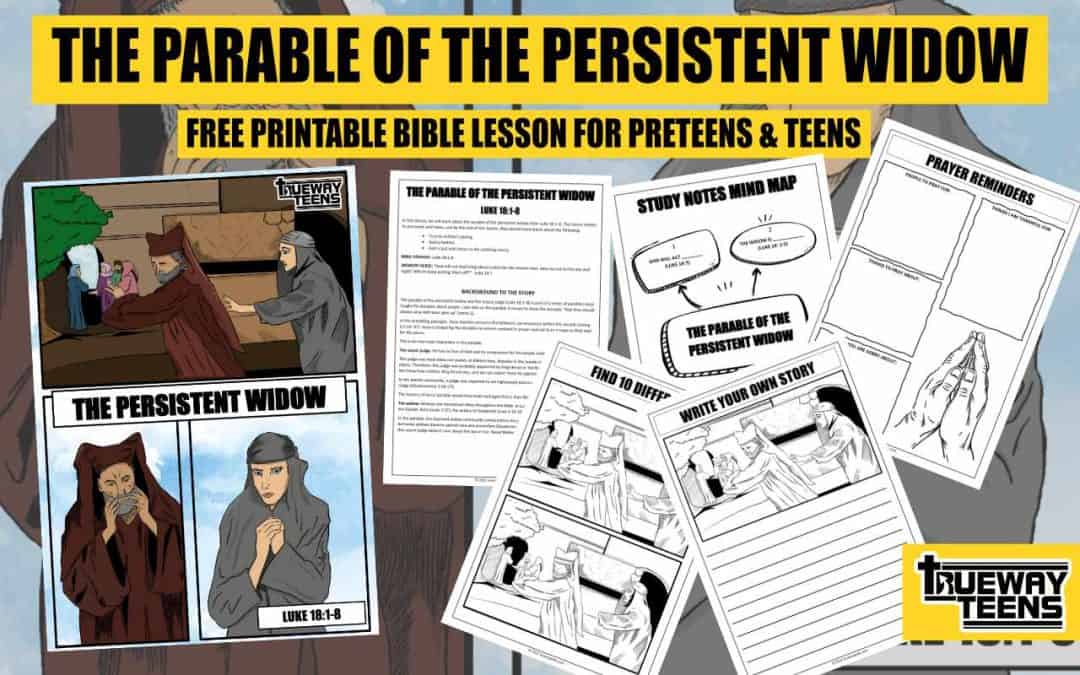In this lesson, we will learn about the parable of the persistent widow from Luke 18:1-8. This lesson relates to pre-teens and teens, and by the end of this lesson, they should have learnt about the following:
- To pray without ceasing.
- God is faithful.
- God is just and shows us His unfailing mercy.
BIBLE PASSAGE: Luke 18:1-8
MEMORY VERSE: “And will not God bring about justice for His chosen ones, who cry out to him day and night? Will He keep putting them off?” – Luke 18:7
DOWNLOAD THE FREE PRINTABLE LESSON

Watch the study
BIBLE STUDY NOTES FOR TEENS
The parable of the persistent widow and the unjust judge (Luke 18:1–8) is part of a series of parables Jesus taught His disciples about prayer. Luke tells us this parable is meant to show the disciples “that they should always pray and never give up” (verse 1).
In the preceding passages, Jesus teaches concerns the believers’ perseverance before His second coming (17:22–37). Jesus is preparing the disciples to remain constant in prayer and not to lose hope as they wait for His return.
There are two main characters in the parable.
The unjust judge: He has no fear of God and no compassion for the people under his jurisdiction.
This judge was most likely not Jewish. In Biblical days, disputes in the Jewish community were taken to the elders. Therefore, this judge was probably appointed by King Herod or the Romans to enforce their law. We know how ruthless King Herod was, and we can expect those he appointed to be the same.
In the Jewish community, a judge was expected to act righteously and to recognize that God is the ultimate Judge (Deuteronomy 1:16–17).
The hearers of Jesus’ parable would have been outraged that a man like this held the position of judge.
The widow: Widows are mentioned often throughout the Bible. In Luke alone, we meet the first widow of the Gospel, Anna (Luke 2:37), the widow of Zarephath (Luke 4:25-26), and the Widow of Nain (Luke 7:12).
In this parable, the deprived widow continually comes before the judge to plead her case. The Jewish law demands widows deserve special care and protection (Deuteronomy 10:18; 24:17–21; James 1:27). But this unjust judge doesn’t care about the law or her. Nevertheless, she refuses to give up.
KEY POINTS FROM THE PASSAGE
1. GOD WILL ACT JUSTLY (Verse 7)
The judge in this parable is unjust and not faithful. We are given this parable to see the contrast between man and God. It reminds us that God is faithful, even when man is not.
The first sentence of the parable tells us that this judge did not fear God or respect man. We will come into relation with earthly judges like this one. It can feel useless to ask for their help when we can see their unjust ways.
The widow asks the judge for justice. It is a word that is easy to overlook, but that makes all the difference. The widow wasn’t asking for a favour. She didn’t want to be shown mercy on a debt or a mistake. She didn’t want revenge. She was asking for something that was rightfully hers. Justice.
The laws of our country are there to provide justice. We are aware of the negative consequences if we break them, but there is also the positive side of the law, such as the right to education, health care, and freedom to vote.
Unaware of our rights, we can easily be stripped of them. As God’s children, there is so much we are entitled to. We must study our Bible and know our rights so that we can ask in accordance with them. 1 John 5:14 states that “this is the confidence we have in approaching God: that if we ask anything according to His will, He hears us”.
2. THE WIDOW IS PERSISTENT (verse 2-5)
The woman’s persistence helps bring her justice. The point here is not that God is reluctant to do what is right and that if we annoy God enough, He helps us out of pity. Instead, if the unfaithful judge helps the vulnerable widow when he hears her cries, how much more will God help us when He hears us?
God is faithful and just. He will deliver us from all our unrighteousness.
The widow understood her right to justice. She didn’t have a fixed number of times to ask before giving up. She would ask as long as was necessary.
We should not pray x number of times and then give up on that request. Jesus shared this parable “to show them that they should always pray and not give up” (Luke 18:1). Some parents have prayed for years for their children, and then one day, they commit their life to Jesus. Some people have prayed their whole life for a ministry, and God has fulfilled it in their later years. We know for sure that God will keep every promise in the Bible and fulfil His will in His perfect timing.
3. NOT NOW DOES NOT MEAN NO (verse 5)
At first, the judge doesn’t grant the widow’s request, but eventually he grants the judice she deserves.
Although we may “cry out to God, day and night” (vs. 7), His justice may seem to be delayed in our eyes. Here Jesus assures us that in God’s plan, it comes “speedily” and without delay.
The Apostle Peter was mocked by some who asked, “Where is the promise of His (Jesus) coming? For since the fathers fell asleep, all things continue as they were from the beginning of creation” (2 Peter 3:4)
Peter answers their doubt with, “But do not forget this one thing, dear friends: With the Lord a day is like a thousand years, and a thousand years are like a day. The Lord is not slow in keeping His promise, as some understand slowness. Instead, He is patient with you, not wanting anyone to perish, but everyone to come to repentance.”
God’s timing is different to our own. Sometimes we can become impatient with God, but He is never slow in keeping His promises rather His timing is always perfect. We must learn to be faithful in prayer as we await the fulfilment of His promises.
4. WILL YOU BE FOUND FAITHFUL? (Verse 8)
It is important to remember that this parable was written in the context of Jesus speaking of His return. Jesus knew there was a danger of His people losing heart as they waited on coming and cease to pray.
Jesus ends the parable with a question, “when the Son of Man comes, will he find faith on the earth?” He says, “you can be sure that I will return and bring about justice on the earth. Don’t be worried about Me fulfilling My promises. Rather, show concern for your faithfulness.” It’s not God’s faithfulness that is weak but our own.
God will keep all His promises (Philippians 1:6). He is just and will answer our prayers (Matthew 7:7-11). It’s up to us to remain faithful in prayer.
CONCLUSION
Sometimes it can feel like we are praying for no reason or that our prayers go no farther than the sky. But God does hear our prayers. If the unjust judge hears the cries of the persistent widow, how much more will God hear the cries of His children? We must be faithful and confident as we pray without ceasing. God always answers prayers, and He will always be the just Heavenly Judge, listening to the outcries of the vulnerable.
YOUTH GAMES AND ACTIVITIES FOR THE PERSISTENT WIDOW
DON’T GIVE UP
- Create six difficult but doable challenges.
- Some examples could be holding a plank for 1 minute, Say the alphabet backwards. Write your name with your feet and so on.
- Give the player a dice to role. Each number will correspond to a challenge.
- They will earn a point to completing the challenge.
- Talk about how it was important they didn’t give up.
PRAYER SCAVENGER HUNT
- Talk to the children about things that are important to pray about. Take some time to think of situation outside of their immediate circle such as the persecute church. Justice. National leaders and so on.
- Once you have a selection of items. Write them on cards and hide them around a space.
- Children then head out to find all the cards and take some time to pray for them once found.
CREATE A PRAYER BOARD
- A prayer board makes a wonderful reminder to be faithful in prayer.
- Take time to create and decorate a board to hang prayer requests.
- Give the group some cards to write a request and hand on the board.
- (You could also use the cards from the scavenger hunt activity.) Make sure you go back to the board on a regular basis to pray for the items and give thanks for answered prayer.
Free printable Teen Worksheets in the lesson pack.

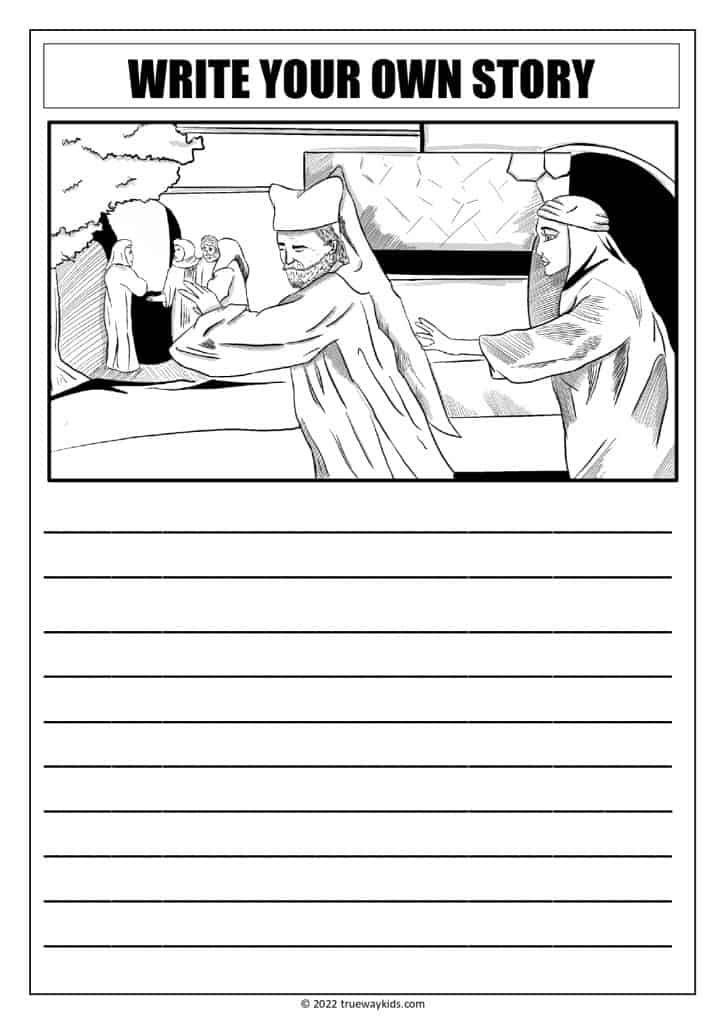
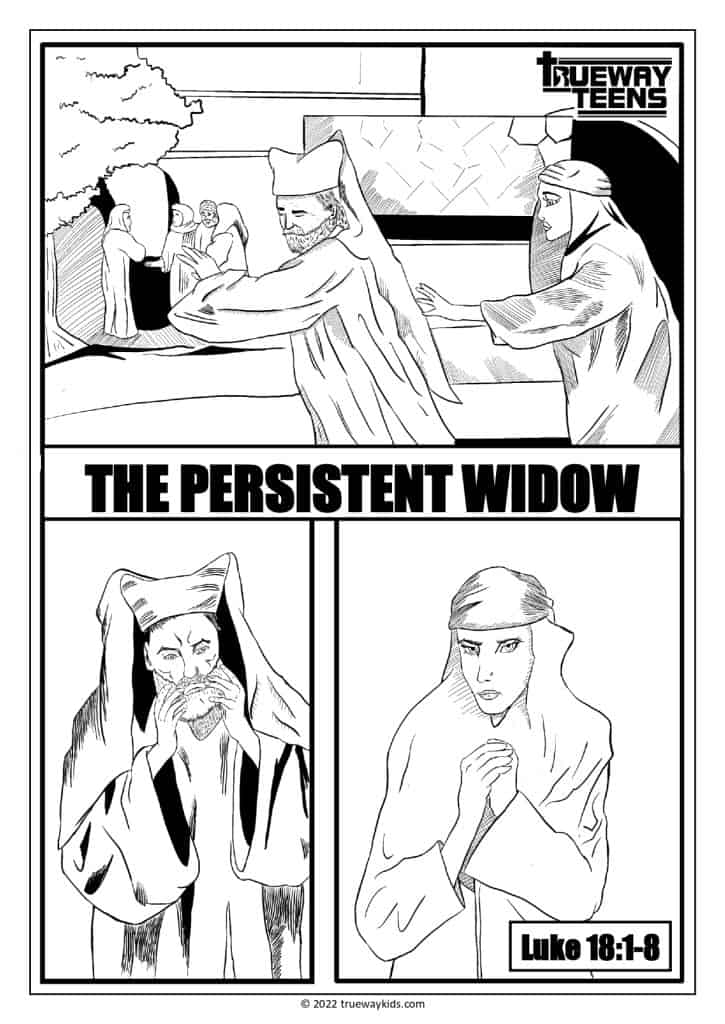
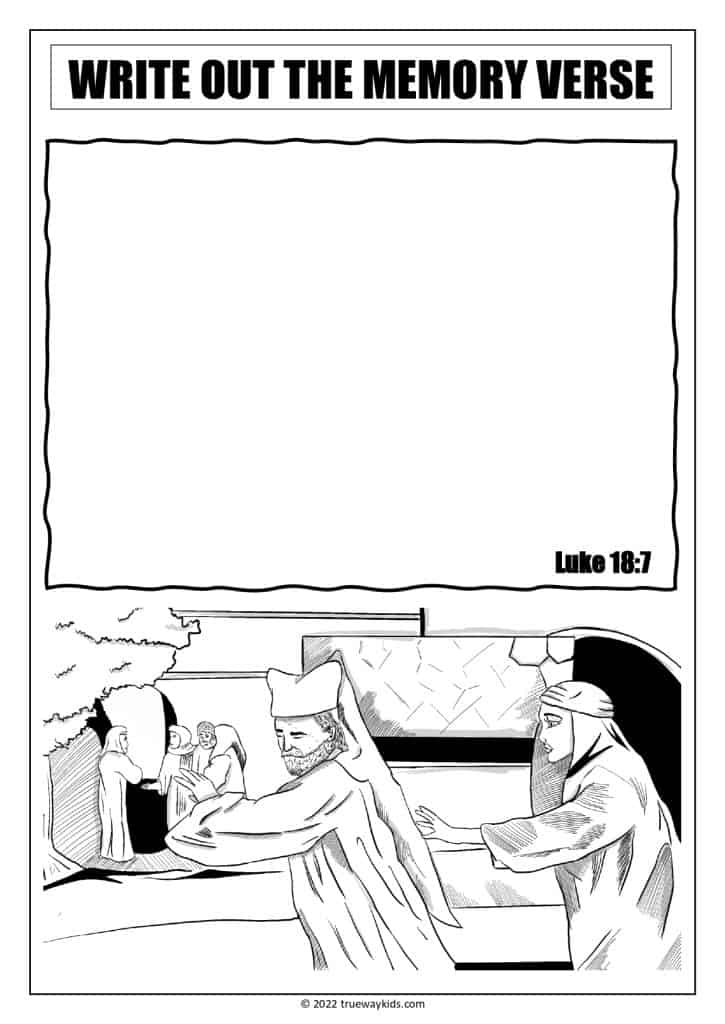
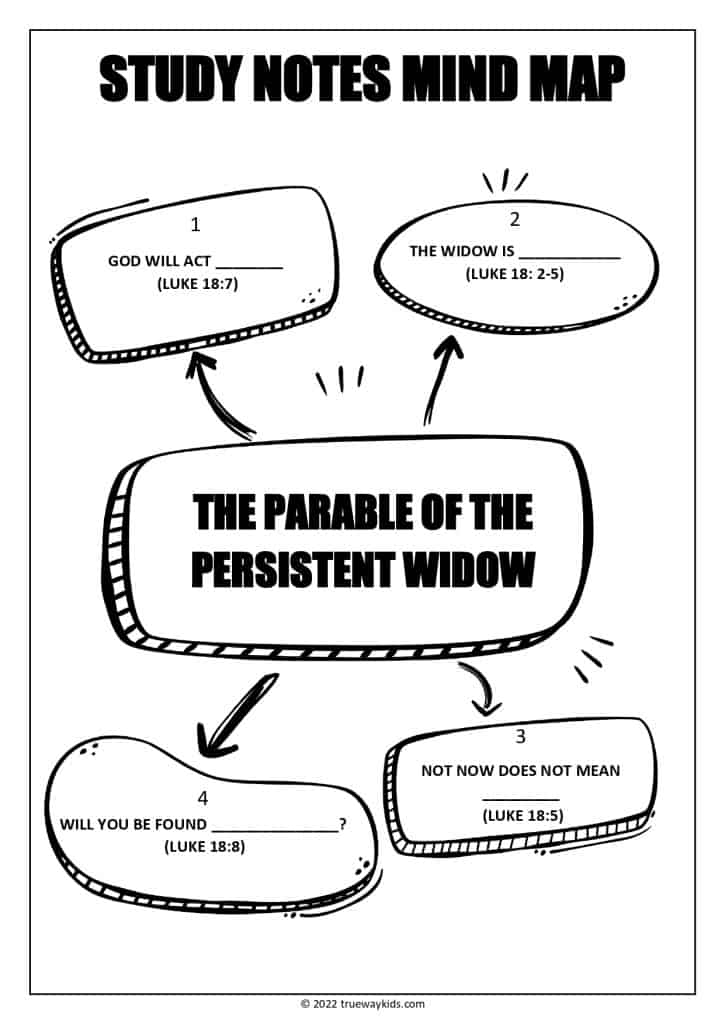
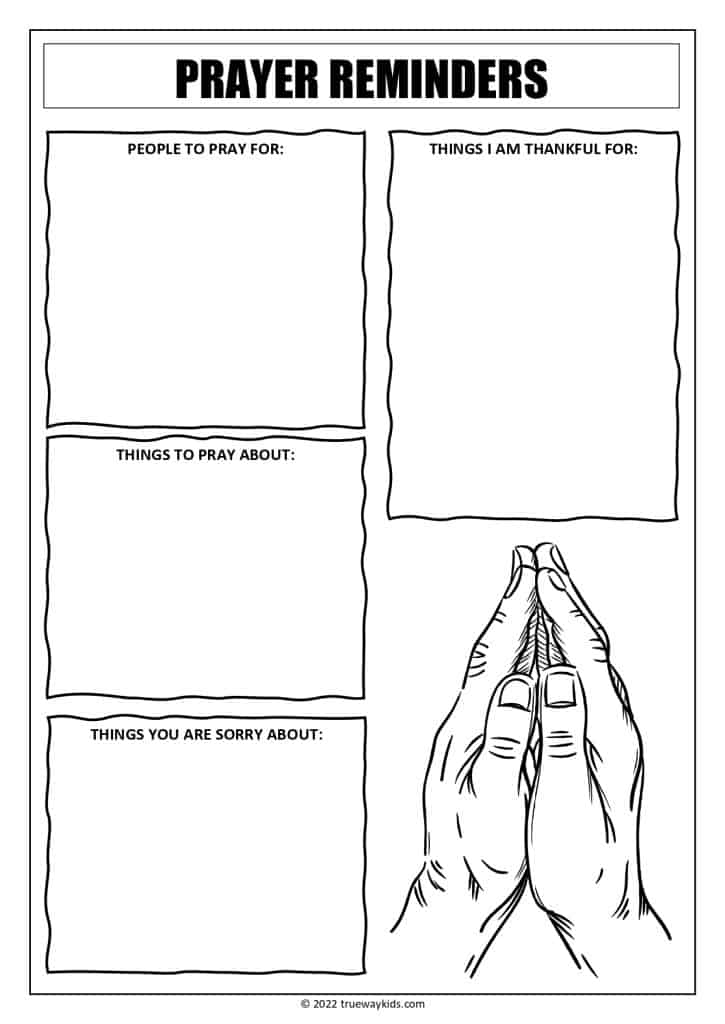


DOWNLOAD THE FREE PRINTABLE LESSON


